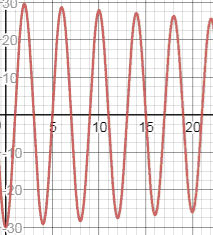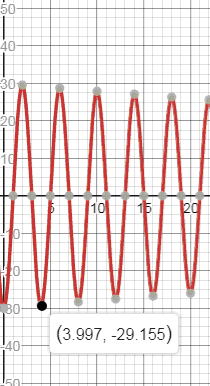
In Problems 45-50. the distance (in meters) of the bob of a pendulum of mass (in kilograms) from its rest position at time (in seconds) is given. The bob is released from the left of its rest position and represents a negative direction.
(a) Describe the motion of the object. Be sure to give the mass and damping factor.
(b) What is the initial displacement of the bob? That is, what is the displacement at ?
(c) Graph the motion using a graphing utility.
(d) What is the displacement of the bob at the start of the second oscillation?
(e) What happens to the displacement of the bob as time increases without bound?
To find: Describe the motion of the object. Be sure to give the mass and damping factor.
b. What is the initial displacement of the bob? That is, what is the displacement at ?
c. Graph the motion using a graphing utility.
d. What is the displacement of the bob at the start of the second oscillation?
e. What happens to the displacement of the bob as time increases without bound?
Answer to Problem 48AYU
a. It is damped motion with a bob of mass 35kg and a damping factor of
b. Initial displacement is meters leftward
c. Graph is plotted
d. Displacement of the bob at the second oscillation is meters leftwards.
e. Hence increases displacement tends to become 0 or the bob comes to rest.
Explanation of Solution
Given:
The distance (in meters) of the bob of a pendulum of mass (in kilograms) from its rest position at time (in seconds) is given. The bob is released from the left of its rest position and represents a negative direction.
Formula used:
The displacement of an oscillating object from its at–rest position at time is given by ,
where is the damping factor or damping coefficient and is the mass of the oscillating object. Here is the displacement at , and is the period under simple harmonic motion (no damping).
Calculation:
a.
,
From the given equation
b the damping factor is and
mass of the bob is
It is damped motion with a bob of mass 35kg and a damping factor of
b. To find the initial displacement let us substitute in the given equation.
Initial displacement is meters leftward
c. The graph of

d. From the graph below we see that the displacement of the bob at the second oscillation is , that is meters leftwards.

e. Displacement of the bob as increases tends to 0. Hence increases displacement tends to become 0 or the bob comes to rest.
Chapter 8 Solutions
Precalculus
Additional Math Textbook Solutions
Calculus for Business, Economics, Life Sciences, and Social Sciences (14th Edition)
Elementary Statistics (13th Edition)
Thinking Mathematically (6th Edition)
Algebra and Trigonometry (6th Edition)
College Algebra with Modeling & Visualization (5th Edition)
- please do Q3arrow_forwardUse the properties of logarithms, given that In(2) = 0.6931 and In(3) = 1.0986, to approximate the logarithm. Use a calculator to confirm your approximations. (Round your answers to four decimal places.) (a) In(0.75) (b) In(24) (c) In(18) 1 (d) In ≈ 2 72arrow_forwardFind the indefinite integral. (Remember the constant of integration.) √tan(8x) tan(8x) sec²(8x) dxarrow_forward
- Find the indefinite integral by making a change of variables. (Remember the constant of integration.) √(x+4) 4)√6-x dxarrow_forwarda -> f(x) = f(x) = [x] show that whether f is continuous function or not(by using theorem) Muslim_mathsarrow_forwardUse Green's Theorem to evaluate F. dr, where F = (√+4y, 2x + √√) and C consists of the arc of the curve y = 4x - x² from (0,0) to (4,0) and the line segment from (4,0) to (0,0).arrow_forward
- Evaluate F. dr where F(x, y, z) = (2yz cos(xyz), 2xzcos(xyz), 2xy cos(xyz)) and C is the line π 1 1 segment starting at the point (8, ' and ending at the point (3, 2 3'6arrow_forwardCan you help me find the result of an integral + a 炉[メをメ +炉なarrow_forward2 a Can you help me find the result of an integral a 아 x² dxarrow_forward
 Calculus: Early TranscendentalsCalculusISBN:9781285741550Author:James StewartPublisher:Cengage Learning
Calculus: Early TranscendentalsCalculusISBN:9781285741550Author:James StewartPublisher:Cengage Learning Thomas' Calculus (14th Edition)CalculusISBN:9780134438986Author:Joel R. Hass, Christopher E. Heil, Maurice D. WeirPublisher:PEARSON
Thomas' Calculus (14th Edition)CalculusISBN:9780134438986Author:Joel R. Hass, Christopher E. Heil, Maurice D. WeirPublisher:PEARSON Calculus: Early Transcendentals (3rd Edition)CalculusISBN:9780134763644Author:William L. Briggs, Lyle Cochran, Bernard Gillett, Eric SchulzPublisher:PEARSON
Calculus: Early Transcendentals (3rd Edition)CalculusISBN:9780134763644Author:William L. Briggs, Lyle Cochran, Bernard Gillett, Eric SchulzPublisher:PEARSON Calculus: Early TranscendentalsCalculusISBN:9781319050740Author:Jon Rogawski, Colin Adams, Robert FranzosaPublisher:W. H. Freeman
Calculus: Early TranscendentalsCalculusISBN:9781319050740Author:Jon Rogawski, Colin Adams, Robert FranzosaPublisher:W. H. Freeman
 Calculus: Early Transcendental FunctionsCalculusISBN:9781337552516Author:Ron Larson, Bruce H. EdwardsPublisher:Cengage Learning
Calculus: Early Transcendental FunctionsCalculusISBN:9781337552516Author:Ron Larson, Bruce H. EdwardsPublisher:Cengage Learning





